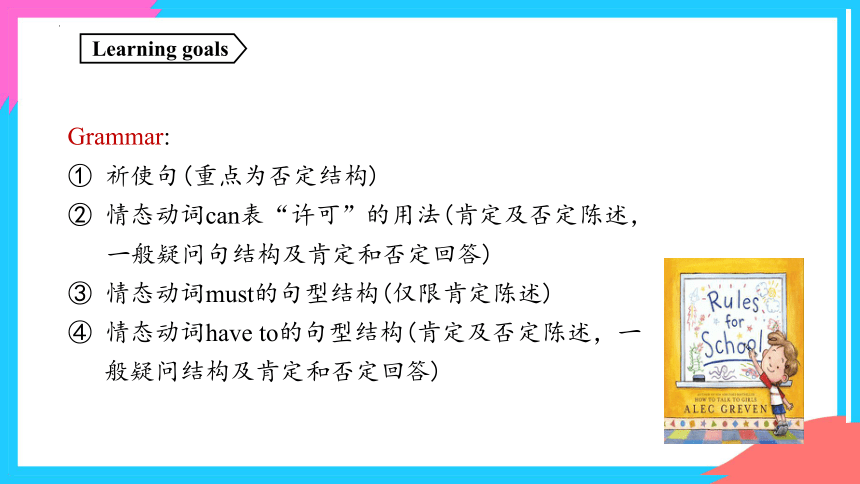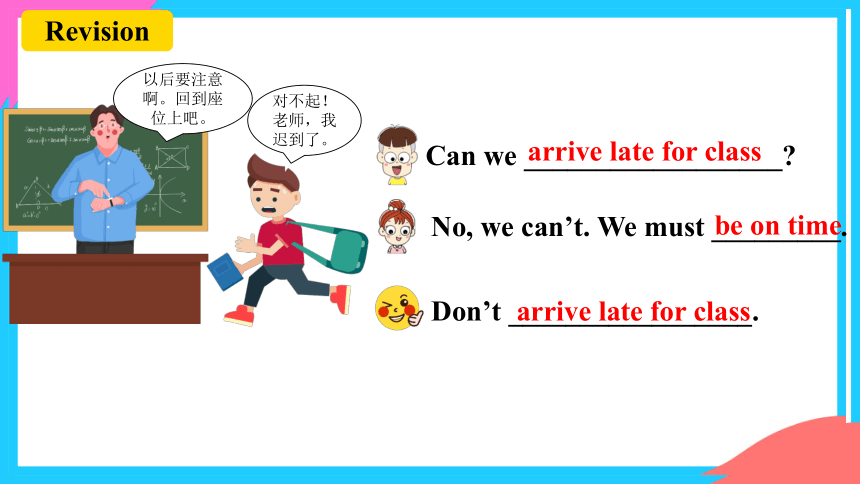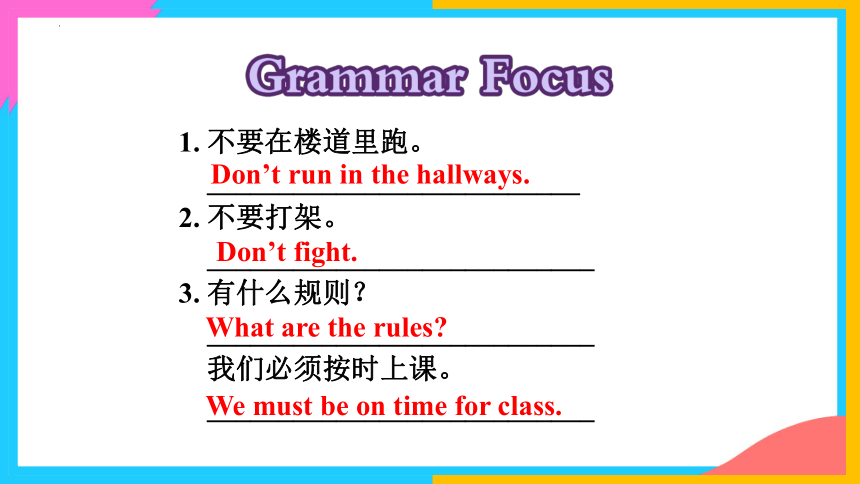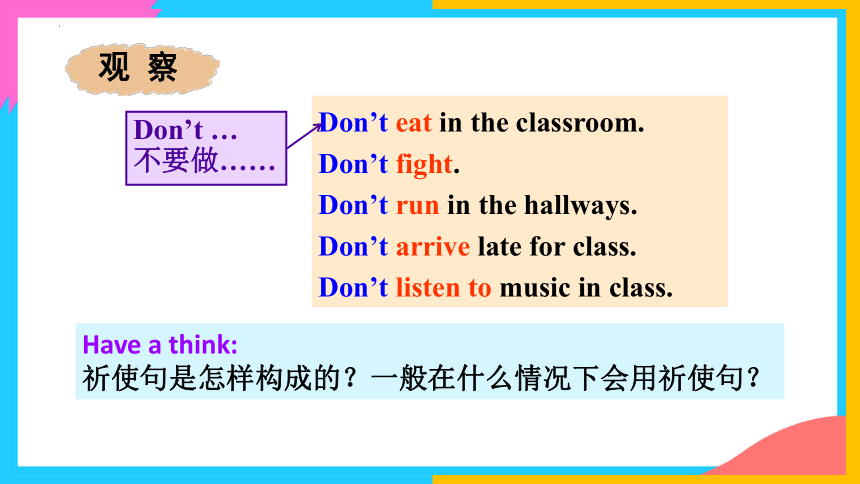Unit 4 Section A(Grammar Focus-3c)- 七年级英语下册同步课件+内嵌视频(人教版)
文档属性
| 名称 | Unit 4 Section A(Grammar Focus-3c)- 七年级英语下册同步课件+内嵌视频(人教版) |

|
|
| 格式 | pptx | ||
| 文件大小 | 27.8MB | ||
| 资源类型 | 试卷 | ||
| 版本资源 | 人教新目标(Go for it)版 | ||
| 科目 | 英语 | ||
| 更新时间 | 2024-03-19 06:56:19 | ||
图片预览












文档简介
(共45张PPT)
Unit 4
Don’t eat in class.
语法精讲精练
Grammar:
① 祈使句(重点为否定结构)
② 情态动词can表“许可”的用法(肯定及否定陈述, 一般疑问句结构及肯定和否定回答)
③ 情态动词must的句型结构(仅限肯定陈述)
④ 情态动词have to的句型结构(肯定及否定陈述,一般疑问结构及肯定和否定回答)
Learning goals
Warming up
Do as I say!
Raise your hands!
Use your pen to take notes!
Look at the blackboard!
Express yourself bravely!
Say “I can!” loudly!
R
U
L
E
S
RULES
Game time
Lead in
Warming-up
Can we __________________
Don’t _________________.
No, we can’t. We must _________.
arrive late for class
be on time
arrive late for class
对不起! 老师,我迟到了。
以后要注意啊。回到座位上吧。
Revision
Can we ____________________
Don’t ___________________.
No, we can’t. We must _________.
run in the hallways
walk
run in the hallways
We can
play computer games.
do homework in class.
listen to the teachers in class.
watch TV on school nights.
read a book.
wear hats in class.
ride bikes at school.
draw on the wall.
eat anything in class.
listen to music in class.
We can’t
Revision
1. A: What are the rules in our school
B: We must be on time for class.
2. A: Can we …
B: Yes, we can. / No, we can’t. We must…
3. A: Do we have to …
B: Yes, we do. / No, we don’t.
Talk about our school rules
1. 不要在楼道里跑。
__________________________
2. 不要打架。
___________________________
3. 有什么规则?
___________________________
我们必须按时上课。
___________________________
Don’t fight.
Don’t run in the hallways.
What are the rules
We must be on time for class.
4. 我们可以在教室里吃东西吗?
_________________________________________
不能。但我们可以在餐厅里吃东西。
__________________________________________
5. 我们可以在上课的时候带帽子吗?
_________________________________________
可以。/ 不可以。
__________________________________________
Can we wear a hat in class
No, we can’t, but we can eat in the dining hall.
Can we eat in the classroom
Yes, we can. / No, we can’t.
6. 他在学校里必须穿校服吗?
_____________________________________
是的,必须。/ 不,不必。
_____________________________________
7. 你们必须做什么?
_____________________________________
在图书馆里我们必须保持安静。
_____________________________________
Yes, he does. / No, he doesn’t.
Does he have to wear a uniform at school
What do you have to do
We have to be quiet in the library.
Don’t eat in the classroom.
Don’t fight.
Don’t run in the hallways.
Don’t arrive late for class.
Don’t listen to music in class.
Don’t …
不要做……
Have a think:
祈使句是怎样构成的?一般在什么情况下会用祈使句?
观 察
祈使句一般用来表示请求、命令、劝说、号召、警告等。
祈使句中, 通常省略第二人称主语you。
肯定式以动词原形开头,否定式一般在动词原形前加don’t。
e.g. Come and join us.
Read after me.
Don’t be late.
Don’t talk in class!
Don’t let the children swim in the river.
归 纳
1. 以行为动词原形开头,简称Do型。
e.g. Come here. 到这儿来。
2. 以动词be开头,简称Be型。
e.g. Be quiet, please. 请安静。
3. 以Let开头,简称Let型。
e.g. Let’s go! 咱们走吧!
一、祈使句的肯定式
有时可在祈使句的句首或句尾加上please,使语气显得客气、有礼貌。如果在句尾加please,应该用逗号与前句隔开。e.g. Go this way, please. 请这边走。
注意:
1. Do型和Be型的否定式是在句首加don’t。
e.g. Don’t sit here. 不要坐在这儿。
Don’t be late. 别迟到。
2. 以let开头的祈使句,其否定式有两种:
1) 直接在句首加don’t
2) let +宾语 + not + 动词原形 + (其他)
e.g. Don’t let him go. 不要让他走。
Let’s not go there. 咱们别去那儿。
二、祈使句的否定式
注意:
“No+名词/动词 ing形式”表示禁止或规劝,常用于公共场所。
e.g.
No photos! 禁止拍照!
No smoking! 禁止吸烟!
祈使句,祈使句,请求、命令或建议。
主语是you常省去,动词原形开头记。
否定形式要注意,句首要把don’t加。
要讲客气用please,句首、句末没关系。
祈使句用法歌诀
(2022四川遂宁中考)
1. —Sam, _______ run in the hallways. It's very dangerous.
—Sorry, Ms. Black.
A. do B. don't C. not D. doesn't
(2022四川广元中考)
2. — ________ silent, please! You are in the library.
— I’m sorry, madam.
A. Keep B. To keep C. Keeping D. Kept
B
A
单项选择。
1. ____ listen to music in the classroom.
A. Not B.No C.Don't
2. Tom,please ____ the classroom now.
A. clean B.to clean C.cleans
3. Let's ____ on time for classes.
A. be B.be not C.are
4. She has to ____ her homework every night.
A. does B.do C.doing
5. Sorry,you ____ play basketball in the classroom.
A. can't B.don't C.don't have to
C
A
A
B
A
情态动词can, must, have to 后面都接动词原形
Have a think:
1. 情态动词在用法上有什么共同点?
2. can在本单元主要表示什么含义?它还可表达什么意思?
3. have to在用法上与其他情态动词有何区别?
观 察
can 可以,表示请求、允许。
I can play badminton, but I can’t play volleyball.
can还可表示能力, 能,会。
-- Can the students run in the hallways
-- Yes, they can./No, they can’t.
We can’t eat in the classroom.
could 也可表示请求,但比can的语气更委婉。
Could you tell him to call me back
can
归 纳
肯定句:
主语+can+动词原形+其他.
否定句:
主语+can not/can’t+动词原形+其他.
疑问句:
Can+主语+动词原形+其他
肯定回答:Yes, 主语+can.
否定回答:No, 主语+can’t.
情态动词can的句型结构:
must 必须;一定
表示主观需要或责任感的驱使有必要或有义务去做某事,没有人称和时态的变化,后接动词原形。
句型结构:主语+must+动词原形+其他
e.g. Don’t arrive late for class. We must be on time.
You must read a book before you watch TV.
mustn’t 表示 “不准; 禁止”。
e.g. You mustn’t talk to your mother like that.
have to 必须;不得不
表示因客观的需要不得不做某事,有人称和时态的变化,后接动词原形。可用于不同的时态,有人称和数的变化。
其否定式don’t / doesn’t have to表示“不必;没必要”。
否定形式和疑问句形式均需要借助助动词do才可以进行变化。
e.g. It’s a little late and I have to go now.
You don’t have to come if you don’t want to.
She has to finish her work today.
--Does he have to go to bed now
--Yes, he does./ No, he doesn’t.
(2022北京中考)
1. —_________I take photos here
—Sorry, you can't. It's not allowed in the museum.
A. Must B. Need C. Can D. Will
(2022·江苏徐州中考)
2. —Can we play games here
—Better not. If you ________,please go to the open space there.
A. must B. can C. may D. will
C
A
(2022辽宁朝阳)
3. —Dad, must I become a doctor like you when I finish university in the future
—No, you________. You can make your own decision and do whatever you like.
A. don’t have to B. can’t C. mustn’t D. couldn’t
(2022辽宁本溪、辽阳、葫芦岛中考)
4. —The paper cutting is pretty lively, who made it
—It ________ be Amy. None of us except her is able to do it.
A. would B. need C. must D. can
A
C
根据句意,用can和can’t填空。
1. Mr. Green_______ smoke here because there’s a sign on the wall. It says “No smoking.”
2. It’s very hot outside. You______ wear a hat.
can’t
can
3. We _______ eat in the classroom because it’s impolite to teachers.
4. I ______ go to bed after 11:00 on school night.
5. The students _____ read books and magazines in the library.
can’t
can
can’t
用have to或has to填空。
1.We ________ clean our classroom after school.
2.She _________ make her bed after getting up.
3.It’s late. Mr. Beckman ________ go to work by car.
4.Emily and Peter join a music club. They __________ practice the guitar every day.
have to
have to
has to
has to
按要求完成句子。
6. Lily can play the guitar.(改为一般疑问句并作否定回答)
—_____ Lily _____ the guitar
—____,she ______.
7. Jack has to play the piano every weekend.(改为一般疑问句)
_____ Jack ________ play the piano every weekend
8. Be quick.(改为否定句)
__________________________________
9. You can't eat food in class.(改为祈使句)
___________________________________
10. You can't be late for class next time.(改为祈使句)
_____________________________________
Can
play
No
can't
Does
have to
Don't be quick.
Don't eat food in class.
Don't be late for class next time.
11. He has to eat breakfast quickly. (改为一般疑问句)
____________________________________________
12. Play volleyball after class. (改为否定句)
___________________________________________
Does he have to eat breakfast quickly
Don’t play volleyball after class.
13. We can wear sports shoes in class. (改为一般疑问) ___________________________________________
14. Don’t arrive late for class. (改为同义句)
____________________________________________
15. Eric has to do his homework before six. (对划线部分提问)
____________________________________________
Can we wear sports shoes in class
You must be on time for class.
What does Eric have to do before six
Library Rules
Don’t talk.
_______________________________
_______________________________
______________________________________________________________
Write the rules for the school library.
Don’t listen to music in the library.
Don’t eat in the library.
Don’t take pictures/photos in the library.
Write the rules for the school library.
Library Rules
No talking!
No school bags!
No food!
No wet umbrellas!
No listening to music!
1. Be quiet (she/have to/in the library)
Q: Does she have to be quiet in the library
A: Yes, she does.
Use the words to make questions about the rules. Then write answers according to your school.
2. Eat (he/have to/in the dining hall)
Q: _________________________________
A: __________________________________
Yes, he does.
Does he have to eat in the dining hall
4. Wear a hat (we/can/in the classroom)
Q: __________________________________
A: ___________________________________
Can we wear a hat in the classroom
No, we can’t.
3. Listen to music (we/can/in the hallways)
Q: __________________________________
A: __________________________________
Can we listen to music in the hallways
No, we can’t.
At my dream school, we don’t have to come to school every day…
We can eat in class…
Make up five cool rules for your dream school. Share your rules with the class. Your classmates vote for the Coolest School!
We don’t have to wear school uniforms…
We don’t have to do homework every day…
Discuss and make rules for the computer room in your school.
Computer Room Rules
_________________
_________________
_________________
_________________
_________________
We must be quiet in the computer room.
Don’t run in the computer room.
Don’t eat or drink in the computer room.
Wear slippers in the computer room.
Computer Room Rules
___________________________________
___________________________________
___________________________________
___________________________________
___________________________________
We must be quiet in the computer room.
Don’t eat or drink in the computer room.
Don’t run in the computer room.
Wear slippers in the computer room.
Clean the computer room every day.
1. Jim, you ___________ clean your room now. It’s so dirty.
2. You ___________ eat too much ice-cream. It’s not healthy.
3. Cindy lives with her grandparents and she __________ see her parents only on weekends.
4. My bike doesn’t work so I ___________ walk to school.
5. You ___________ do your homework right now. You __________ do it after dinner.
can’t
must
can
must / have to
can, can’t, must, have to, don’t have to
I. 根据语境,从方框中选择恰当的情态动词填空。
don’t have to
can
Ⅱ. 根据括号内的要求完成下列各题,每空一词(含缩略形式)。
1. You can’t draw on the desk. (改为祈使句)
_______ _______ on the desk.
2. Steve has to go home before seven. (改为否定句)
Steve _______ _______ _______ go home before seven.
3. —Can you talk in the library (补全否定答语)
—No, _______ _______.
I / we can’t
Don’t draw
doesn’t have to
4. Jane has to exercise every day. (改为一般疑问句并作肯定回答)
— _______ Jane _______ _______ exercise every day
—_______, _______ _______.
5. Students can’t run in the hallways. (对划线部分提问)
_______ _______ students _______ in the hallways
What can’t do
Does have to
Yes she does
1. Review Grammar.
2. Write five rules in your family.
3. Preview the new words and expressions in Section B.
No matter what things, to learn the rules to little detours.
无论做什么事,学好规矩才能少走弯路。
与君共勉
Unit 4
Don’t eat in class.
语法精讲精练
Grammar:
① 祈使句(重点为否定结构)
② 情态动词can表“许可”的用法(肯定及否定陈述, 一般疑问句结构及肯定和否定回答)
③ 情态动词must的句型结构(仅限肯定陈述)
④ 情态动词have to的句型结构(肯定及否定陈述,一般疑问结构及肯定和否定回答)
Learning goals
Warming up
Do as I say!
Raise your hands!
Use your pen to take notes!
Look at the blackboard!
Express yourself bravely!
Say “I can!” loudly!
R
U
L
E
S
RULES
Game time
Lead in
Warming-up
Can we __________________
Don’t _________________.
No, we can’t. We must _________.
arrive late for class
be on time
arrive late for class
对不起! 老师,我迟到了。
以后要注意啊。回到座位上吧。
Revision
Can we ____________________
Don’t ___________________.
No, we can’t. We must _________.
run in the hallways
walk
run in the hallways
We can
play computer games.
do homework in class.
listen to the teachers in class.
watch TV on school nights.
read a book.
wear hats in class.
ride bikes at school.
draw on the wall.
eat anything in class.
listen to music in class.
We can’t
Revision
1. A: What are the rules in our school
B: We must be on time for class.
2. A: Can we …
B: Yes, we can. / No, we can’t. We must…
3. A: Do we have to …
B: Yes, we do. / No, we don’t.
Talk about our school rules
1. 不要在楼道里跑。
__________________________
2. 不要打架。
___________________________
3. 有什么规则?
___________________________
我们必须按时上课。
___________________________
Don’t fight.
Don’t run in the hallways.
What are the rules
We must be on time for class.
4. 我们可以在教室里吃东西吗?
_________________________________________
不能。但我们可以在餐厅里吃东西。
__________________________________________
5. 我们可以在上课的时候带帽子吗?
_________________________________________
可以。/ 不可以。
__________________________________________
Can we wear a hat in class
No, we can’t, but we can eat in the dining hall.
Can we eat in the classroom
Yes, we can. / No, we can’t.
6. 他在学校里必须穿校服吗?
_____________________________________
是的,必须。/ 不,不必。
_____________________________________
7. 你们必须做什么?
_____________________________________
在图书馆里我们必须保持安静。
_____________________________________
Yes, he does. / No, he doesn’t.
Does he have to wear a uniform at school
What do you have to do
We have to be quiet in the library.
Don’t eat in the classroom.
Don’t fight.
Don’t run in the hallways.
Don’t arrive late for class.
Don’t listen to music in class.
Don’t …
不要做……
Have a think:
祈使句是怎样构成的?一般在什么情况下会用祈使句?
观 察
祈使句一般用来表示请求、命令、劝说、号召、警告等。
祈使句中, 通常省略第二人称主语you。
肯定式以动词原形开头,否定式一般在动词原形前加don’t。
e.g. Come and join us.
Read after me.
Don’t be late.
Don’t talk in class!
Don’t let the children swim in the river.
归 纳
1. 以行为动词原形开头,简称Do型。
e.g. Come here. 到这儿来。
2. 以动词be开头,简称Be型。
e.g. Be quiet, please. 请安静。
3. 以Let开头,简称Let型。
e.g. Let’s go! 咱们走吧!
一、祈使句的肯定式
有时可在祈使句的句首或句尾加上please,使语气显得客气、有礼貌。如果在句尾加please,应该用逗号与前句隔开。e.g. Go this way, please. 请这边走。
注意:
1. Do型和Be型的否定式是在句首加don’t。
e.g. Don’t sit here. 不要坐在这儿。
Don’t be late. 别迟到。
2. 以let开头的祈使句,其否定式有两种:
1) 直接在句首加don’t
2) let +宾语 + not + 动词原形 + (其他)
e.g. Don’t let him go. 不要让他走。
Let’s not go there. 咱们别去那儿。
二、祈使句的否定式
注意:
“No+名词/动词 ing形式”表示禁止或规劝,常用于公共场所。
e.g.
No photos! 禁止拍照!
No smoking! 禁止吸烟!
祈使句,祈使句,请求、命令或建议。
主语是you常省去,动词原形开头记。
否定形式要注意,句首要把don’t加。
要讲客气用please,句首、句末没关系。
祈使句用法歌诀
(2022四川遂宁中考)
1. —Sam, _______ run in the hallways. It's very dangerous.
—Sorry, Ms. Black.
A. do B. don't C. not D. doesn't
(2022四川广元中考)
2. — ________ silent, please! You are in the library.
— I’m sorry, madam.
A. Keep B. To keep C. Keeping D. Kept
B
A
单项选择。
1. ____ listen to music in the classroom.
A. Not B.No C.Don't
2. Tom,please ____ the classroom now.
A. clean B.to clean C.cleans
3. Let's ____ on time for classes.
A. be B.be not C.are
4. She has to ____ her homework every night.
A. does B.do C.doing
5. Sorry,you ____ play basketball in the classroom.
A. can't B.don't C.don't have to
C
A
A
B
A
情态动词can, must, have to 后面都接动词原形
Have a think:
1. 情态动词在用法上有什么共同点?
2. can在本单元主要表示什么含义?它还可表达什么意思?
3. have to在用法上与其他情态动词有何区别?
观 察
can 可以,表示请求、允许。
I can play badminton, but I can’t play volleyball.
can还可表示能力, 能,会。
-- Can the students run in the hallways
-- Yes, they can./No, they can’t.
We can’t eat in the classroom.
could 也可表示请求,但比can的语气更委婉。
Could you tell him to call me back
can
归 纳
肯定句:
主语+can+动词原形+其他.
否定句:
主语+can not/can’t+动词原形+其他.
疑问句:
Can+主语+动词原形+其他
肯定回答:Yes, 主语+can.
否定回答:No, 主语+can’t.
情态动词can的句型结构:
must 必须;一定
表示主观需要或责任感的驱使有必要或有义务去做某事,没有人称和时态的变化,后接动词原形。
句型结构:主语+must+动词原形+其他
e.g. Don’t arrive late for class. We must be on time.
You must read a book before you watch TV.
mustn’t 表示 “不准; 禁止”。
e.g. You mustn’t talk to your mother like that.
have to 必须;不得不
表示因客观的需要不得不做某事,有人称和时态的变化,后接动词原形。可用于不同的时态,有人称和数的变化。
其否定式don’t / doesn’t have to表示“不必;没必要”。
否定形式和疑问句形式均需要借助助动词do才可以进行变化。
e.g. It’s a little late and I have to go now.
You don’t have to come if you don’t want to.
She has to finish her work today.
--Does he have to go to bed now
--Yes, he does./ No, he doesn’t.
(2022北京中考)
1. —_________I take photos here
—Sorry, you can't. It's not allowed in the museum.
A. Must B. Need C. Can D. Will
(2022·江苏徐州中考)
2. —Can we play games here
—Better not. If you ________,please go to the open space there.
A. must B. can C. may D. will
C
A
(2022辽宁朝阳)
3. —Dad, must I become a doctor like you when I finish university in the future
—No, you________. You can make your own decision and do whatever you like.
A. don’t have to B. can’t C. mustn’t D. couldn’t
(2022辽宁本溪、辽阳、葫芦岛中考)
4. —The paper cutting is pretty lively, who made it
—It ________ be Amy. None of us except her is able to do it.
A. would B. need C. must D. can
A
C
根据句意,用can和can’t填空。
1. Mr. Green_______ smoke here because there’s a sign on the wall. It says “No smoking.”
2. It’s very hot outside. You______ wear a hat.
can’t
can
3. We _______ eat in the classroom because it’s impolite to teachers.
4. I ______ go to bed after 11:00 on school night.
5. The students _____ read books and magazines in the library.
can’t
can
can’t
用have to或has to填空。
1.We ________ clean our classroom after school.
2.She _________ make her bed after getting up.
3.It’s late. Mr. Beckman ________ go to work by car.
4.Emily and Peter join a music club. They __________ practice the guitar every day.
have to
have to
has to
has to
按要求完成句子。
6. Lily can play the guitar.(改为一般疑问句并作否定回答)
—_____ Lily _____ the guitar
—____,she ______.
7. Jack has to play the piano every weekend.(改为一般疑问句)
_____ Jack ________ play the piano every weekend
8. Be quick.(改为否定句)
__________________________________
9. You can't eat food in class.(改为祈使句)
___________________________________
10. You can't be late for class next time.(改为祈使句)
_____________________________________
Can
play
No
can't
Does
have to
Don't be quick.
Don't eat food in class.
Don't be late for class next time.
11. He has to eat breakfast quickly. (改为一般疑问句)
____________________________________________
12. Play volleyball after class. (改为否定句)
___________________________________________
Does he have to eat breakfast quickly
Don’t play volleyball after class.
13. We can wear sports shoes in class. (改为一般疑问) ___________________________________________
14. Don’t arrive late for class. (改为同义句)
____________________________________________
15. Eric has to do his homework before six. (对划线部分提问)
____________________________________________
Can we wear sports shoes in class
You must be on time for class.
What does Eric have to do before six
Library Rules
Don’t talk.
_______________________________
_______________________________
______________________________________________________________
Write the rules for the school library.
Don’t listen to music in the library.
Don’t eat in the library.
Don’t take pictures/photos in the library.
Write the rules for the school library.
Library Rules
No talking!
No school bags!
No food!
No wet umbrellas!
No listening to music!
1. Be quiet (she/have to/in the library)
Q: Does she have to be quiet in the library
A: Yes, she does.
Use the words to make questions about the rules. Then write answers according to your school.
2. Eat (he/have to/in the dining hall)
Q: _________________________________
A: __________________________________
Yes, he does.
Does he have to eat in the dining hall
4. Wear a hat (we/can/in the classroom)
Q: __________________________________
A: ___________________________________
Can we wear a hat in the classroom
No, we can’t.
3. Listen to music (we/can/in the hallways)
Q: __________________________________
A: __________________________________
Can we listen to music in the hallways
No, we can’t.
At my dream school, we don’t have to come to school every day…
We can eat in class…
Make up five cool rules for your dream school. Share your rules with the class. Your classmates vote for the Coolest School!
We don’t have to wear school uniforms…
We don’t have to do homework every day…
Discuss and make rules for the computer room in your school.
Computer Room Rules
_________________
_________________
_________________
_________________
_________________
We must be quiet in the computer room.
Don’t run in the computer room.
Don’t eat or drink in the computer room.
Wear slippers in the computer room.
Computer Room Rules
___________________________________
___________________________________
___________________________________
___________________________________
___________________________________
We must be quiet in the computer room.
Don’t eat or drink in the computer room.
Don’t run in the computer room.
Wear slippers in the computer room.
Clean the computer room every day.
1. Jim, you ___________ clean your room now. It’s so dirty.
2. You ___________ eat too much ice-cream. It’s not healthy.
3. Cindy lives with her grandparents and she __________ see her parents only on weekends.
4. My bike doesn’t work so I ___________ walk to school.
5. You ___________ do your homework right now. You __________ do it after dinner.
can’t
must
can
must / have to
can, can’t, must, have to, don’t have to
I. 根据语境,从方框中选择恰当的情态动词填空。
don’t have to
can
Ⅱ. 根据括号内的要求完成下列各题,每空一词(含缩略形式)。
1. You can’t draw on the desk. (改为祈使句)
_______ _______ on the desk.
2. Steve has to go home before seven. (改为否定句)
Steve _______ _______ _______ go home before seven.
3. —Can you talk in the library (补全否定答语)
—No, _______ _______.
I / we can’t
Don’t draw
doesn’t have to
4. Jane has to exercise every day. (改为一般疑问句并作肯定回答)
— _______ Jane _______ _______ exercise every day
—_______, _______ _______.
5. Students can’t run in the hallways. (对划线部分提问)
_______ _______ students _______ in the hallways
What can’t do
Does have to
Yes she does
1. Review Grammar.
2. Write five rules in your family.
3. Preview the new words and expressions in Section B.
No matter what things, to learn the rules to little detours.
无论做什么事,学好规矩才能少走弯路。
与君共勉
同课章节目录
- Unit 1 Can you play the guitar?
- Section A
- Section B
- Unit 2 What time do you go to school?
- Section A
- Section B
- Unit 3 How do you get to school?
- Section A
- Section B
- Unit 4 Don't eat in class.
- Section A
- Section B
- Unit 5 Why do you like pandas?
- Section A
- Section B
- Unit 6 I'm watching TV.
- Section A
- Section B
- Review of Units 1-6
- Unit 7 It's raining!
- Section A
- Section B
- Unit 8 Is there a post office near here?
- Section A
- Section B
- Unit 9 What does he look like?
- Section A
- Section B
- Unit 10 I'd like some noodles.
- Section A
- Section B
- Unit 11 How was your school trip?
- Section A
- Section B
- Unit 12 What did you do last weekend?
- Section A
- Section B
